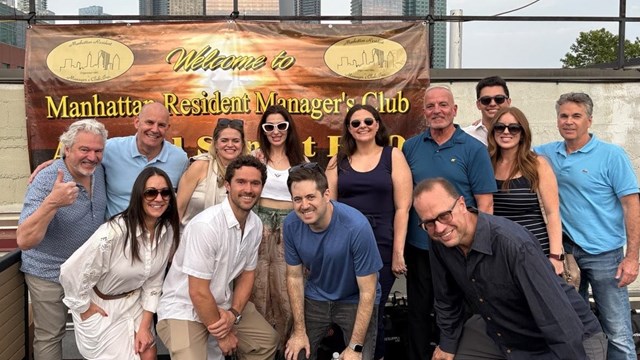
What do you call an organization whose membership includes property managers, plumbers, electricians, security companies, glass specialists and attorneys? You call it diverse, far-reaching, and multifaceted - but you could also call it the New York Association of Realty Managers, or NYARM.
Founded in 1958, NYARM is a non-profit organization dedicated to raising the standard of excellence for real estate and property management professionals in the New York City area. This is done through education, information, legislative initiatives, and a peer network that makes NYARM the benchmark for technological advancement and career enhancement in the New York region.
At the helm of this more than 600-member group is a new president, Rochelle Captan, executive director Margie Russell, and an 18-member board of directors made up of veteran property managers and professional industry associates. NYARM is also composed of various committees, and the organization offers a wide variety of monthly educational events and an annual real estate trade expo that this year will be in October.
"Monthly programs are what's topical at the moment," explains Russell. "In September 2003, we had a panel address installing an emergency backup generator in the building and we also had a meeting on preparing for your CPA's audit. After the meeting, we digest and follow up this information in our monthly educational publication."
There are only two paid staff members and volunteers run the rest of the organization's efforts. Membership fees support the staff salaries and programs.
"What makes us different is that we are a New York State based organization, not a local chapter of a national organization," says Russell. "New York City [property managers] have such unique real estate experiences that they have to have an organization that serves their distinctive needs."
Getting Certified
To help educate its members, NYARM offers a certification program in association with New York University's School of Continuing and Professional Studies and The Real Estate Institute. This professional realty management program provides training for building owners (both private and cooperative), managers, supervisors and maintenance personnel in building management.
Upon completion of the course, NYARM grants members the easy-to-remember title of nyarm (New York Accredited Realty Manager) that is recognized and approved by the New York State Division of Housing and Community Renewal (DHCR) and the New York City Department of Housing Preservation and Development (HPD).
"We also encourage study with other educational venues which would be applied towards the nyarm certification designation," says Russell. "Certain course work at HPD, Baruch College, and NYU are perfect examples. Also, study for other property management designations can be applied."
When Betsy Hurley, president of Platinum Properties in New York, joined NYARM three years ago, it was primarily for the purpose of obtaining health insurance, but Hurley says she gained much more.
"I obtained my nyarm accreditation, and the networking has been amazing," says Hurley. "More importantly, NYARM has been right on top of really important issues for us. For example, knowing how to approach a mold or lead issue. It's a very progressive organization that helps us stay on top of everything. It makes our jobs easier."
Not only does NYARM make their jobs easier, but the organization also maintains a strong focus on the moral character and ethics of the industry. Required for certification is an ethics course, presently offered through both NYARM and HPD. NYARM offers this class during their monthly meetings over six sessions, or in a two-day fast-track course.
NYARM also maintains its own code of ethics with key points that deal with such issues as the duty to disclose information to the building's owner, not acting counter to the interests of the owner or to the benefit of the manager, and maintaining the utmost responsibility when handling funds.
What's Next?
Margie Russell is excited about the future of NYARM. After managing properties in the New York City co-op and condo market for more than 18 years, Russell has been NYARM's executive director for two years and says she hopes to use her experience in the industry to provide insight into areas that need improvement.
"My personal challenge in the near future is to make the boards of co-op and condo buildings understand that the management fee paid to the management companies has not kept pace with the constant flow of new complexities handed to those in the property management profession," says Russell. "Digesting and reacting to the multiple levels of responsibilities takes deliberate time and thought which cannot be rushed and should not be bought cheaply."
Captan assumed the position of NYARM president this year, but has been a member of the organization for over 30 years and been a property manager for almost 40. The Cooperator recently had the opportunity to speak with Captan and get some of her thoughts on where the organization is heading in 2004.
You have been a member of NYARM for 30 years and now you are president. What's changed during that time?
"Thirty years ago, we were trying to develop the kind of association we have become now. Our main interest was to train managers - which we have done - but today everything is so much more intricate. There are technological concerns. For example, some buildings have their own power plants, and there is so much involved there. Energy and energy conservation is a major item of importance because the cost of energy is so unbelievable. Today you also have the necessary cameras and security functions we didn't even think of back then.
"Today, being a property manager also requires a lot of knowledge about engineering to keep our development safe for our tenants. There's also so much more legislation involved; new rules and regulations that come down each year, such as with lead paint and asbestos. The change and the growth of the industry make it important for a person managing a property to do it properly. The education has become a major part of what we're trying to do.
"We give seminars on everything and anything on what's happening in the industry so basically we have advanced to educate our members so that they can manage a building from every perspective."
What have been some of NYARM's successes?
"The entire industry has benefited from the legislative and educational issues we've delved into and teach to our manager members."
What are your top concerns during your presidency?
"One of our main focuses of concentration for the last 15 years has been the licensing of managers. Every day we are dealing with licensed electricians and plumbers, but a manager doesn't have to be licensed. We are accredited because of the designation of nyarm and other organizations, but there should also be a requirement for licensing so when a housing or management company hires a manager, they know they are getting an authorized person on the level they need to be on. They should have the necessary education to do the work. We are reaching out to various legislature members to have them see the importance of this and we've seen a growth in the interest.
We'd also like to see an influx of other professionals in the field as members, including lawyers, engineers and architects. Increasing our membership is important as well as the growth of our magazine. We are really looking for growth in every area of our organization."
How have the responsibilities of the New York property manager changed over the years?
Our tenants and renters are more fragile and want to make sure people in charge have everything organized for them if something happened - where to go in case of an emergency and what to do. For example, [in the buildings where I am property manager] we are distributing a booklet on emergency management to each person, so in case of emergency they know where to go first. We're dealing with thousands of people. It's really become a focus for us."
What's the most important thing to know about NYARM?
"Membership is not required, but it adds to anybody's professional life. Networking is very important in our careers.
"At meetings, we meet all of the people who can help us to achieve everything we need for our housing development or company. Over the years, I have found information available to me through our associate members right at the meetings.
"It's a necessity for people who are managing billions of dollars in real estate to be familiar with everything that's going on and have this knowledge at their fingertips so they can offer it to the board of directors that they're working for. It's a place to learn, get ideas, talk to your peers and find out what they're doing. On a daily basis, one of us will call the other to see what we are doing about an array of issues."
Lisa Iannucci is a freelance writer living in Poughkeepsie, New York.





Leave a Comment